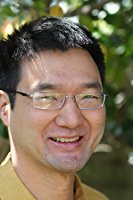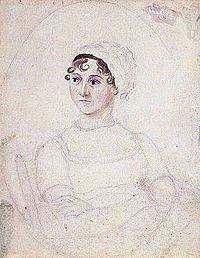Jane Austen and modern politics: the game theory of cluelessness and self-promotion
Two hundred years ago Jane Austen died on 18 July 2017 in Winchester (in the country of Hampshire in the South of England). The cause, according to later diagnosticians, is thought to have been Addison's disease or Hodgkins lymphoma. Her premature death at 41 was as tragic for British literature as that of John Keats.
Since then her reputation has only grown. Her portrait (not a good one according to her relatives) is due to appear on the British £10 note, replacing Charles Darwin.
Who was Jane Austen, really?
Was Austen a conservative or proto-feminist, political novelist or bodice-ripper, ironist or stern moralist? The scant details of her personal life encourage all kinds of speculation from critics in search of fame and fortune. One of the strangest and fascinating theories: she was a game theorist of human relations with lessons for politics today.
Michael Suk-Young Chwe, a 51-year-old California political science professor with degrees in economics, argues in Jane Austen, Game Theorist(2013): "Jane Austen systematically explored the core ideas of game theory in her six novels, roughly two hundred years ago."
Chelsea Clinton's a fan
Chelsea Clinton tweeted:
"Can't wait to read Michael Chwe's book on Austen & game theory, two of my favorite topics (nerdy, I know)"
The most implausible title?
John Mullan in his U.K. Guardian review suggested the book is in the running to win a prize for the most implausible title about Austen's work.
He seems to have missed the strategic deployment of game theory by Chwe himself in promoting his book. Chwe (pronounced Cheh) got the idea for the analysis from watching the movie Clueless (2005) with his children and discovering it was based on Emma (1816).
"I had always been taught that game theory was a mathematical thing," he told Jennifer Schuessler of The New York Times. "But when you think about it, people have been thinking about strategic action for a long time."
Thank Jane Austen for cluelessness theory
What Austen brings to game theory is something that today's specialists still haven't taken on board, says Chwe: "the conspicuous absence of strategic thinking, what I call 'cluelessness'.
Five kinds of cluelessness
Austen's novels give five explanations for cluelessness.
'I'm a numbers person'
Lack of natural ability is one reason. Some people are not “naturally” geared towards strategic thinking and are inclined instead toward numbers, visual detail, literal meaning, and clear status distinctions.
'How can you not see how much more important I am?'
The second reason is social distance: as with the politician General Tilney in Northanger Abbeyand Lady Catherine de Burgh in Pride and Prejudice. You can't imagine other people aren't as impressed with your social status as you are.
'But I thought you felt like me'
Austen's third example is excessive self-reference, using yourself too much as a template for understanding others. Chwe suggests Robert McNamara was guilty of this in his post-war reflections and attempts to reach reconciliation with the Vietnamese. He put their differences down to misunderstandings, whereas the Vietnamese chief general Vo Nguyen Giap said "You wished to defeat us -- to destroy us. So we were forced to fight you."
Don't think about the feelings of the proles
Most important for current politics, perhaps, is the fourth reason for cluelessness: status maintenance. "A higher-status person is not supposed to think about the intentions of a lower-status person, and risks blurring the status distinction if she does," says Chwe.
'Do what I say'
The fifth reason is that it actually works to believe you can determine another person’s values: "You do not have to think about another person’s preferences because you can change them."
What to do at traffic signals
The clueless strategy works in daily life, Chwe points out. Approaching an intersection where you want to turn left, if the light turns from yellow to green, you will probably swing across without looking at an approaching driver. By avoiding eye contact, you send a message to the other driver presuming that vehicle will stop. "If I look at you, then you know that I might change my action given what you do."
'People should be thinking of how I feel"
When police in Birmingham, Alabama, used water hoses and dogs on children demonstrating for civil rights in 1963, the federal government worried about the U.S. image abroad. Governor George Wallace, however, declared: "It seems to me that other parts of the world ought to be concerned about what we are thinking of them instead of what they think of us. After all, we're feeding most of them."
Chwe suggests that George W. Bush's attitude towards Iran and Iraqis as President exemplified this kind of cluelessness.
Empathy prevention in Iraq
Discussing empathy prevention, he focuses particularly on the 2004 Fallujah siege by U.S. forces after four Blackwater contractors were killed and their bodies mutilated. The attack on Fallujah proved a public relations disaster. Hundreds of civilians were killed and thousands who escaped to other parts of Iraq took with them tales of terror.
The top U.S. general and his staff had opposed the invasion. Senior commanders said it robbed them of the element of surprise and told the insurgents they could provoke the U.S. into battle. Identifying the killers was also a police job, they felt.
'We will not be intimidated'
But the U.S. was obsessed with its status (U.S. civilian chief Paul Bremer described the insurgents as "human jackals who defiled the streets of Fallujah" while President Bush declared "We will not be intimidated"). "U.S. cluelessness is evident in its obsession with status," Chwe remarks. In contrast to the military commanders, Bremer used a police graduation ceremony to establish the social status of the graduates, the "good" as distinct from "evil" Iraqis (226). As a result, the U.S. delivered what the U.N. envoy to Iraq condemned as "collective punishment".
"Calling your enemy an animal is a way of saying that you don’t have to think about his motivations, making, for example, negotiations and bargaining, which require you to acknowledge his goals, inconceivable," Chwe adds.
The message for Hillary
What the book could have told Chelsea Clinton's mother is that "being good at strategic thinking can keep people from helping you," since it is not charming to be strategic in your thinking. Your consideration can be read as insincere (Elinor in Sense and Sensibility, and people think you already know everything (Emma).
Learning from social movements
Chwe later explained how he planned to get media attention for "a book about something interesting, though obscure" (http://blog.press.princeton.edu/2013/06/25/ucla-today-how-professors-can-get-publicity-for-their-scholarly-books/).
As a games theorist, he knew that Rosa Parks did not spark the Civil Rights movement in the U.S. simply by refusing to give up her seat on a bus.
"After Mrs. Parks’s arrest on Dec. 1, 1955, the veteran activist Jo Ann Gibson Robinson mimeographed 52,500 leaflets announcing a boycott four days later. If any single action started the Montgomery Bus Boycott, it was the printing of these leaflets," he observed.
Starting out lucky
"I vowed to deploy ideas from social movement theory to help publicize it," he admits. His first book was only in the top 42,000 on Amazon. Jane Austen, Game Theorist, went past 200 in a few hours.
He started out lucky: 2013 was the 200th anniversary of Pride and Prejudice.
"The main stroke of good fortune for my book was that a New York Times reporter, Jennifer Schuessler, wrote a very thoughtful and fun story about it. "
Tweet, post and Google...
"I did my best to be active on Twitter, even directing people to bookstores that still had copies, and I 'followed' every person who tweeted about the story. Not everyone follows you back, but now I have around 500 followers who have expressed interest in the book, which is great. I set up my own web page for my book, which includes all news stories and blog posts about the book, so people can see how many others are talking about it. If people tweet about your book, retweet. I periodically Google my book title to see which blogs and news outlets might be discussing it, and if possible I leave a comment referring them to my web page."
... like a 20-year-old
"Engage in every way possible," he advises. "To promote my book, I made a YouTube video because I wanted to engage people with images as well as words.I also got involved with my book’s cover. I wanted the book to feel fun and light, even whimsical, so I emailed the comic artist Sonny Liew and asked him to do the cover. This was money very well spent."
"Finally, start thinking like a 20-year-old. So to promote your book, do all of the crazy things 20-year-olds do, like Facebook, Twitter, Tumblr, Reddit, Youtube and Imgur."
Jane Austen, Game Theorist is still ranked at 36 in the Amazon list of books on the math theory.


_hires.jpg)
Disclaimer: I am just a bot trying to be helpful.